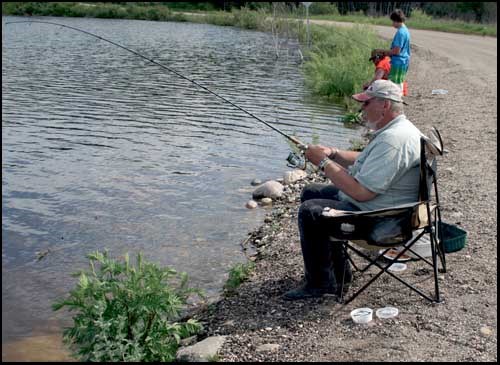Welcome to Week XII of 'Fishing Parkland Shorelines'. Like most of us I am a novice fisherman, loving to fish, but far from an expert, In the following weeks I'll attempt to give those anglers who love to fish but just don't have access a boat a look at some of the options in the Yorkton area where you can fish from shore, and hopefully catch some fish for a good summer fry.''
If you're looking for a fishing spot close to Yorkton with a good record of success, then head east on Highway #10 with a goal of fishing the Togo bridges.
The community of Togo is not very big, population about 100 according the 2006 Census, but for local shore-bound fishermen it is rather well known, although you may not actually see the village when you go fishing.
Instead you are interested in the bridges crossing the Assiniboine River on roads leading into the small community.
There are two options, what is known as the old bridge, and yes, the new bridge.
The old bridge is accessed by turning off Highway #357 and heading north toward Kamsack on Highway #8. Watch for the sign which indicates Togo, turn right and follow it to the bridge.
We headed out to the site in early July and was disappointed to find the uncharacteristically high water levels of the year had fishing spots at the bridge under water.
Ìý
The bridge itself was still well-above the water so landing an angry fish flopping against the line would have been a challenge.
Getting down to the river though was impossible. The one area, as an example, had water levels over a farm fence. The thought of snagging into a barbed wire fence with a hook was not appealing.
The high water also meant the water was still moving pretty good, meaning the likelihood of swirling into unwanted snags was even higher.
While it was not the first time to hit a shore spot and find fishing impossible, in this case standing on the bridge enjoying the view meant seeing fishing jumping all over the bloated river.
In a normal year, with more normal water levels, it's pretty obvious the old Togo bridge has fish catching potential.
So back to Highway #10, where we continue east until we once again see a sign for Togo. This time we turn north and follow a good grid road until we reach the so-called new bridge.
In a normal year the water levels are well below road grade, meaning you have to walk down the rocks on the side of the road, find a safe perch and fish.
That is not the case this year. Water levels are such that you can set up a lawn chair on the road's edge and fish while dangling your feet in the water if you wanted to.
In one small shower I sat in the car leaving the line with pickerel jig in the water, simply holding the rod out the open passenger door.
Now there are a few things to remember fishing the new bridge.
To start with it is basically just east around a curve in the river you hit Lake of the Prairies, the big lake straddling the border between Manitoba and Saskatchewan. As such a license from either province is acceptable at the bridge.
However, Manitoba rules regarding the use of only barbless hooks apply at the bridge. It's easy enough to use a pair of needle-nose pliers to crimp down the barbs, but just make sure you do it.
Since you are fishing barbless, when you do get a bite, set the hook firmly, and keep the tip of the road bent so the line is taught. You don't want to relax pressure and give the fish a chance to spit the hook.
Ìý
The Lake of the Prairie system also has size limits in terms of walleye (pickerel). You are not allowed to keep and walleye between 45 and 70 centimetres. On a Saskatchewan license you are allowed to keep one more than 70-centimetres.
The idea of the slot limit is to protect breeding age, and in particular egg laying fish to ensure future production.
It is a good system in terms of management, as witnessed by a healthy walleye stock in a heavily fished water, but throwing back a 63-centimetre walleye was sad too.
The requirement to release the fish within the 'slot' measurements in another reason for the barbless hook requirement.
While walleye tend to be the stars in terms of fishing Togo bridge, there are some fine, large perch here. You are not going to limit out on them by any means, but they will help fill up your stringer as they are as apt to go after a pickerel rig as are pickerel themselves.
For the most part a jig is the technique employed at the bridge, so take some frozen minnows as bait, pop a couple on the jig hooks, throw out into the water, and wait.
Oh the bridge has pike too. Now pike are usually fished with spoons around here, but they do take a jig on occasion, in fact twice this year the new bridge has gave up a Len Thompson Hat Trick to a jig (perch/pickerel/pike) by my wife.
In terms of easy access from the city, and generally good fishing, although it tends to slow in the heat of summer, the new Togo bridge is hard to beat.
And if water levels decline, don't forget the old bridge either.




